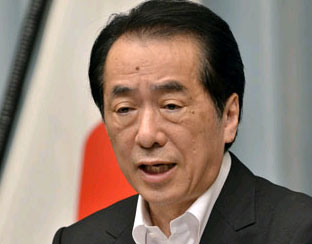Japan's centre-left Prime Minister Naoto Kan said Wednesday that the country must gradually reduce its reliance on atomic power with the eventual goal of becoming nuclear-free.
Four months after the March 11 quake and tsunami triggered the Fukushima nuclear accident, the world's worst since Chernobyl 25 years ago, Kan has repeatedly argued that Japan must focus more on renewables.
Speaking in a televised press conference, he said: "By reducing its reliance on nuclear power gradually, we will aim to become a society which can exist without nuclear power."
 Japanese Prime Minister
Naoto Kan speaks at a press conference at his
office in Tokyo.
(AFP Photo/Yoshikazu Tsuno)
Japanese Prime Minister
Naoto Kan speaks at a press conference at his
office in Tokyo.
(AFP Photo/Yoshikazu Tsuno)
"Considering the grave risk of nuclear accidents, we strongly feel that we cannot just carry on based on the belief that we must only try to ensure (nuclear) safety."
Kan earlier announced a full review of Japan's energy plan, under which atomic power had been set to meet over half of demand by 2030, up from about one third before the March 11 quake-tsunami disaster.
The premier has said he wants to make clean energy sources such as solar, wind and geothermal a new "major pillar" of the industrial power's energy mix.
"If everything goes as scheduled, a renewable energy bill will be discussed in the Diet (legislature) starting tomorrow," Kan said.
The premier, Japan's fifth in as many years, made the speech at a time when he is under intense pressure to step down from political adversaries who accuse him of having bungled Japan's response to the tsunami.
Kan has butted heads with plant operator Tokyo Electric Power Company (TEPCO) over the Fukushima accident.
The premier's scepticism about boosting nuclear power in the quake-prone island nation has also set him on a collision course with pro-nuclear lawmakers, both in the conservative opposition and within his own party.
The earthquake and tsunami crippled the Fukushima plant, which has suffered meltdowns, explosions and radiation leaks into the air, soil and sea.
With all but 19 of Japan's 54 reactors now shut, mostly for regular checks, Japan is going through a power crunch in the sweltering summer months, and there are fears that outages could slow the already limping economy.
"There are worries about power supply in Japan," said Economy Minister Kaoru Yosano earlier on Wednesday. "Manufacturers may well consider moving plants to a country with a stable electricity supply or cheaper labour."
Anti-nuclear sentiment in Japan has grown since the Fukushima disaster, and thousands have since protested at a string of rallies against TEPCO and nuclear power and for a shift toward alternative energy.
Telecom giant Softbank has announced plans to build 10 large-scale solar power plants. Its president Masayoshi Son and 36 of Japan's 47 prefectures launched a council on Wednesday aimed at boosting renewables.
The liberal, mass-circulation Asahi Shimbun daily on Wednesday called for a shift towards a nuclear-free society within two or three decades.
It pointed at an ongoing energy saving campaign, in which companies in Japan's northeast are being asked to cut back use by 15 percent, and argued that, if it works, it proves that Japan can live without atomic power.
The newspaper suggested in its editorial: "How about setting a target of reducing (atomic power) to zero within 20 years, to urge people to make their utmost efforts, and to review the plan every few years?"
- AFP/al


























